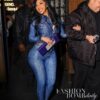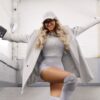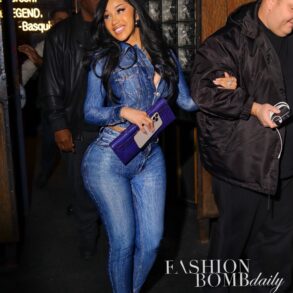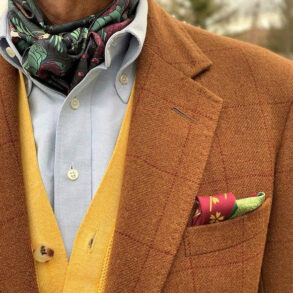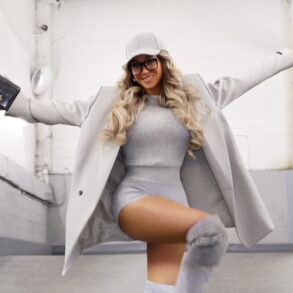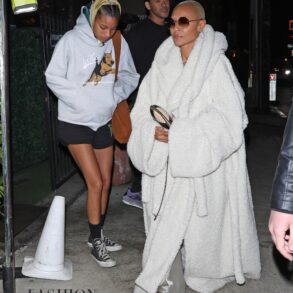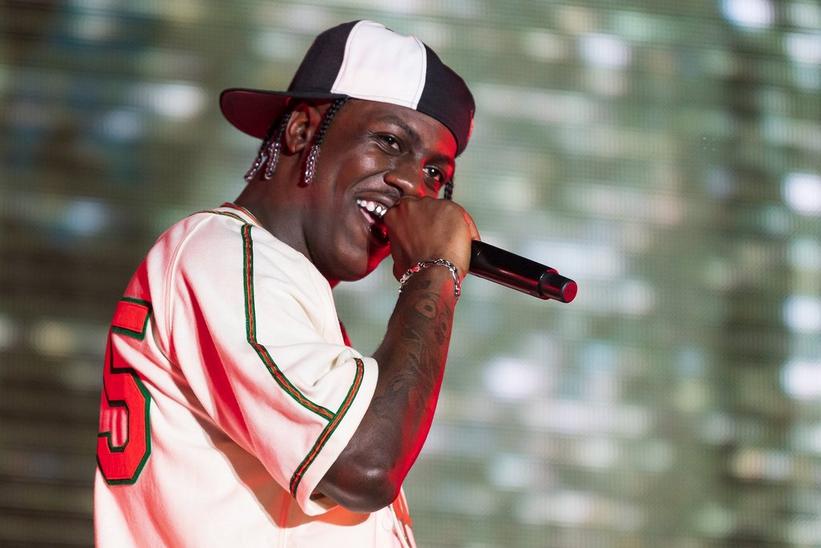
Fans first got to know Lil Yachty for his catchy, sing-songy tunes like “One Night” and “Minnesota,” rap songs that sound like the rapper’s once-signature red braids: bright and attention-getting. But as the man who once dubbed himself the “king of the teens” has now become a father in his (gasp!) mid-20s, his musical horizons have expanded.
While Lil Boat is still making catchy tracks (see his minute-and-a-half long earworm “Poland,” released last fall), his latest album is something else entirely. Inspired by big statement LPs like Pink Floyd‘s 1973 classic Dark Side of the Moon, Lil Yachty’s Let’s Start Here is a psychedelic record created with members of Chairlift and MGMT, as well as Mac DeMarco, Alex G and a handful of other out-of-the-norm collaborators. While the style change may have been unexpected for many, it came out exactly as Yachty envisioned it.
“It felt future-forward, it felt different, it felt original, it felt fresh, it felt strong,” he says. “I’m grateful for the response. It’s nice to have people resonate with a body of work that you’ve worked so hard on and you care so deeply about.”
Yachty’s most recent release, a four-song single pack featuring the swirling “TESLA,” brings him back to a more traditional hip-hop style — by Lil Boat standards, anyway. But even with the four new tracks sprinkled throughout the set list, he’s still determined to share the sound and vibe of Let’s Start Here with his listeners.
The Field Trip Tour, which Lil Yachty kicked off in Washington, D.C. on Sept. 21, brings the album’s trippy vision to the stage. The rapper recruited an all-women band for his latest trek, which includes Lea Grace Swinson and Romana R. Saintil on vocals, Monica Carter on drums, Téja Veal on bass, Quenequia Graves on guitar, and Kennedy Avery Smith on keys.
“My life is surrounded by women,” Yachty explains. “I feel like they are the most important aspect to this world and that they don’t get enough credit or shine — especially Black women.”
GRAMMY.com caught up with Yachty as he was on his way to rehearsal to chat about the tour, the album, and what he learned from four old British guys.
You made your band auditions public by announcing them on social media, which is not the usual way of going about these things. When you had the auditions, what was it like? How many people showed up?
Hundreds of women came from all over. People sent in auditions online. It was so fun to hear so much music and see talent and meet so many different personalities. I felt like Simon Cowell.
Other than musical ability, what were you looking for?
It was nothing more than talent. There would be multiple people with extreme talent, so then it became your own creative spunk: what did you do that made me say, “Oh, okay. I like this. I like this”? I wanted a badass group.
What was behind the decision to put the call out for women only?
My life is surrounded by women — my two assistants, my mother as a manager, a lot of my friends are women. Women really help me throughout my day.
I just think that women are so powerful. I feel like they rule the world. They are the most important aspect to this world and they don’t get enough credit or shine, especially black women. So that was my aura behind it. I just wanted to showcase that women can shred just as good as men.
Is the band going to be performing on your older rap material as well, in addition to the album cuts?
No. I’m not a big fan of rendition rap songs. I think the feeling is in the beat, the feeling is in the instrumentation. When you have to reconstruct it, the bounce gets lost a bit.
Tell me about the rehearsal process once you selected the band members. What was that like?
They’re all so talented, so they all learned it very quick. I gave [the music] to them early, and gave them the stems. When it was day one, they all knew the songs. Even my new guitarist that came in later than everyone, she came in knowing the music.
The rehearsal project for this tour was a little different, because I’m reconstructing the whole album. I’m moving everything around and changing all the transitions and trying to make it trippy. So it’s a process of me figuring out how I want to do things. But they’re so talented and so smart, all I have to do is tell them what I want, and they’ll do it instantly.
Like yesterday, I wanted a solo on the end of a song called “The Alchemist.” Because at the end of [the album version] is this [singer Brittany] Fousheé breakdown and she’s singing in a falsetto. But I took her vocals off and I wanted a solo. And [a band member] was working through it yesterday and it wasn’t quite there. But I’m on the way to rehearsal now, and I know when I walk in this room, it’ll be done. It’ll be crazy. So they all take it very serious and they care, and I love them so much.
The festival shows you’ve done so far have had everyone in Bantu knot hairstyles, sometimes with face paint. Is that going to be the look for this tour?
No, I don’t think so.
What was the thinking behind that look?
I was getting really deep into the world of ’70s bands, ’60s bands. Just unison: moving as one, looking like one, feeling like one. A family, a group, a team. You see us, we’re all together.
When you play rap shows, so much of what you’re doing is keeping a high-energy mood—getting the crowd going, starting mosh pits. With the new songs, it’s about a diversity of feelings. What was that like for you as a band leader?
I’ll tell you, it was not easy. I’ve been in this industry for seven years, and my shows have been high-energy for seven years. So the first time I went on a stage and performed Let’s Start Here, I felt like, “Oh wow, they hate me. Do they hate this?” Plus I have in-ears, so I can’t hear the crowd cheering. I don’t perform with in-ears when I do rap shows.
It took me some time to get used to the switch. Tyler, the Creator once had a talk with me and explained to me that, it’s not that they don’t f— with you, it’s that they’re taking it in. They’re comprehending you. They’re processing and enjoying it. That clicked in me and I got a better understanding of what’s going on.
What is it like in the same show to go from the Let’s Start Here material to the rap stuff?
It’s a relief, because that’s going to my world. It’s super easy for me. It’s like flipping the switch and taking it to the moon.
Now that it’s been the better part of a year since Let’s Start Here came out, how are you feeling about it? What sense do you have of the reaction to it?
Since before it came out, when I was making it, I always felt so strongly because it was something that I felt inside. It felt future-forward, it felt different, it felt original, it felt fresh, it felt strong.
I’m grateful for the response. It’s nice. It’s not what you do it for, but it is extra credit. It’s nice to get that love and to have people resonate with a body of work that you’ve worked so hard on and you care so deeply about.
Have you felt peoples’ reactions change over the past few months?
Well, this is the first time when people are like, “Man, that album changed my life” or “It took me to a different place.” People love my music — always have — but this reaction is, “Man, this album, man, it really took me there.”
It did what it was supposed to do, which was transcend people. If you are on that side of the world and you’re into that type of stuff, it did its job, its course — the same course as Dark Side of the Moon, which is to take you on a journey, an experience.
What was it about Dark Side that grabbed you?
Everything. The cover, the sounds, the transitions, the vocals, the lyrics, the age of Pink Floyd when they made it. I could go on. I got into deep fascination. It was so many things. It’s just pure talent.
I’ve read that you studied Pink Floyd quite a bit, watching interviews and documentaries. What were some of the things you learned from that process and brought to Let’s Start Here?
So many things. The most important element was that I wanted to create a body of work that felt cohesive and that transcended people, and that was a fun experience that could take you away from life.
I was curious about the song “:(failure:(,” where you give a speech about failing. What were your inspirations for that?
“Facebook Story” by Frank Ocean, which is about a girl who thought he was cheating on her because he wouldn’t accept her on Facebook. It inspired me to talk about something.
At first I wanted [“:(failure:(“] to be a poem, and I wanted my friend to say it. We tried it out, but his voice was so f—ing deep. And his poem was so dark — it was about death and s—. I was like, Damn, n—, lighten up. But then I was just like, you know what, I’ll do it, and I’ll speak about something very near and dear to me, which was failure. I felt like it would resonate with people more.
The idea of time shows up on the album a lot, which is something it has in common with Dark Side of the Moon. You talk about running out of time. What are you running out of time to do?
Sometimes I feel like I’m growing so fast and getting so old, and maturing and evolving so quickly, and so many opportunities come into my life. You go on tour, and then you start working on an album, and you run out of time to do certain things. It’s like, “Are we going to be together? If not, I have other things to do.”
I think that’s where it comes from. I don’t have all day to play around. Too many things to do. Then it transpires to feel like I’m running out of time.
I love “drive ME crazy!” I was wondering if there are any particular male/female duets that you looked at as a model when designing that song.
Fleetwood Mac. Again, with all the inspirations for these songs, I still did my twist on them. So I don’t want people to go and be like, “Oh, that sounds nothing like a Fleetwood Mac song.” I wasn’t trying to copy a Fleetwood Mac song. It just inspired me to make a song in that feeling, in that world.
When you began your career, you were the “king of the teens.” Now you’re a father in your mid-twenties. Who’s your audience these days? Is it the people who were teens when you started your career, who are now in their 20s like you, or is it a new crop of teenagers?
I think now it’s from the 12-year-olds to the 40-year-olds. My last festival, I had 50-year-olds in my show. That was so amazing. In the front row, there was an 11-year-old asking for my sneakers, and then in the back, it was 50- and 60-year-olds. It was crazy. The age demographic is insane.
Whenever I’m leaving somewhere, I like to have the window down and see people. [At my last festival] these 60-year-olds were leaving. They’re like, “Man, your album, we love it. That show was so great.” And that’s awesome, because I love [that my music can] touch everyone.
You’ve been opening your recent shows with “the BLACK seminole.” What does that phrase mean to you? How does it relate to the sound of the song and the rest of the lyrics?
It’s saying, “I’m a warrior, I am a king, I am a sex symbol, I am everything good and bad with man, and I’m Black, unapologetically.” That’s what it’s about.
Any final thoughts about the tour?
Just that it’s an experience. You’re not walking into a rinky-dink [show with] some DJ. This is going to be a show.
I feel like it’s the start of my career. I just want people to come in with an open mindset. Not expecting anything, ready for everything.
10 Bingeworthy Hip-Hop Podcasts: From “Caresha Please” To “Trapital”

